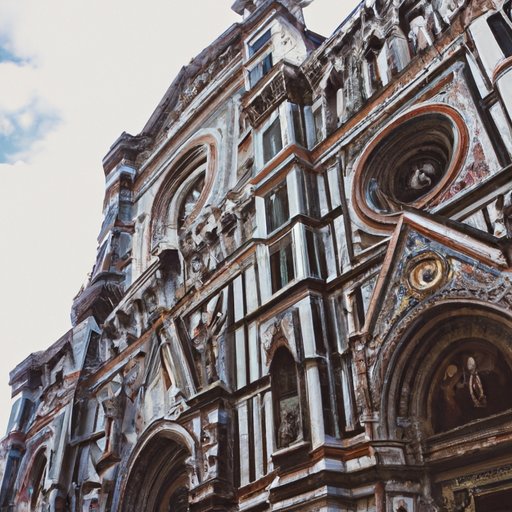Introduction
Italy is known for its vibrant culture, rich history, and delicious food. From the Renaissance to modern-day pop music, Italy has left an indelible mark on the world. In this article, we’ll explore the culture of Italy, from its cuisine to its art, music, and religion.

Exploring Italian Cuisine and its Cultural Impact
Italian cuisine is one of the most beloved in the world. From pizza and pasta to gelato and espresso, Italian food is renowned for its flavor and simplicity. Popular dishes like lasagna, risotto, and cannoli are enjoyed around the globe.
In addition to these classic dishes, each region in Italy has its own unique cuisine. Northern Italy is known for its rich pastas, while the south features a variety of seafood. Central Italy is renowned for its cured meats and cheeses, while Sicily is known for its sweet desserts.
Culinary traditions also play an important role in Italian culture. For example, many families gather together for Sunday lunch, which often features a multi-course meal. Italians also enjoy an afternoon snack called the “merenda,” which typically consists of bread and cheese.
Uncovering Italy’s Rich Artistic Heritage
Art has long been an important part of Italian culture. The Renaissance, which began in the 14th century, saw a resurgence of classical art and philosophy. Artists such as Michelangelo, Leonardo da Vinci, and Raphael created some of the world’s most iconic works during this time.
Baroque art, which began in the 17th century, was characterized by dramatic lighting, vivid colors, and dynamic compositions. Artists such as Bernini and Caravaggio were influential figures in this movement.
Modern Italian art is just as vibrant as its predecessors. Futurism, which began in the early 20th century, sought to capture the dynamism of modern life. Contemporary artists such as Giorgio de Chirico and Lucio Fontana have continued to push the boundaries of art.
Exploring the History and Traditions Behind Italian Music
Music has always been an integral part of Italian culture. Classical composers such as Vivaldi, Rossini, and Verdi are considered some of the greatest in the world. Opera, which originated in Italy, is still performed in theaters around the world.
Popular music is also a major part of Italian culture. Genres such as Neapolitan song, cantautori, and Italo disco continue to be popular today. Modern pop stars such as Eros Ramazzotti and Zucchero are household names in Italy.
Folk music is also important in Italy. The tarantella, a lively dance, is popular in southern Italy. Other folk songs, such as those of the shepherds of Abruzzo, tell stories of love and loss.

Examining the Influence of Religion on Italian Culture
Religion has played an important role in Italian culture for centuries. Catholicism is the predominant faith in Italy, with the Vatican City being the center of the Roman Catholic Church. Other religions, such as Judaism and Islam, also have a presence in Italy.
Religious festivals are celebrated throughout the year. Easter, Christmas, and other Christian holidays are widely observed. Non-Christian holidays such as Hanukkah and Ramadan are also celebrated.
Conclusion
Italy is a nation with a rich cultural heritage. Its cuisine, art, music, and religion have all had an impact on the world. From the Renaissance to modern-day pop music, Italy has left a lasting impression. This article has explored the culture of Italy, from its cuisine to its art, music, and religion.
(Note: Is this article not meeting your expectations? Do you have knowledge or insights to share? Unlock new opportunities and expand your reach by joining our authors team. Click Registration to join us and share your expertise with our readers.)
